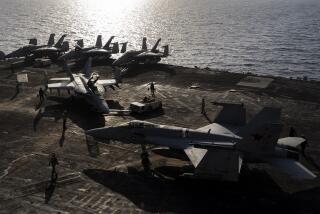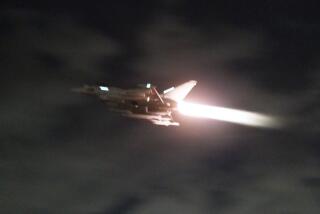U.S. Carrier Welcomes Bush’s Message
- Share via
ABOARD THE USS CONSTELLATION IN THE PERSIAN GULF — For the pilots and grease monkeys revving up this floating air base for war, there’s no clearer argument for punishing Baghdad than the near-daily barrages aimed at U.S. aircraft patrolling the “no-fly” zones in Iraq.
In his State of the Union address, President Bush told U.S. troops to prepare for battle, a call that fell on sympathetic ears here Wednesday. It gave a sense of immediacy to the more than 5,000 sailors and air crew members ready to unleash on Baghdad firepower and frustrations pent up for a dozen years.
Shore-bound citizens of the sole superpower may not be sure of the need to attack Iraq, or the wisdom of doing so, but no such uncertainty deters those plying front-line waters while awaiting word that the time for patience is over.
“We know there is a lot of discussion going on at home about the pros and cons, but as pilots we see violations every day,” said Marine Capt. Brian Schenk of Anaheim. “We find it hard to believe so much of the American public, based on polls, doesn’t think it’s necessary to go to war.”
Schenk, 30, was heartened by Bush’s reference to huge Iraqi stores of anthrax, botulism and other toxins that the administration believes pose a severe threat to the health and security of the United States and justify immediate action against President Saddam Hussein.
Although many aboard this aging aircraft carrier already halfway into its last six-month deployment slept through Bush’s speech, which aired here at 5 a.m. Wednesday, there was a growing mood of eager anticipation as word of the president’s comments spread.
“I was here in 1991 and in 1998. Now I’m back again. I want to see it done this time,” Warrant Officer Lucas Licup of San Diego, the Constellation’s home port, said of deposing Hussein. “We’re here to do the job, and we won’t be satisfied until it’s completed.”
Baghdad’s residual antiaircraft capabilities are proof that the regime remains a menace to neighbors and a hostile U.S. adversary, the fliers argue.
“There are frequent attempts by the Iraqis to shoot us down,” said Capt. Mark Fox, air wing commander and another veteran of the 1991 Persian Gulf War, after which the no-fly zones were set up to protect Kurds in northern Iraq and Shiite Muslims in the south.
“We’re doing everything we can to take prudent steps,” he said, “but if the Iraqis were complying with the U.N. sanctions, we wouldn’t be doing the things we’re doing here.”
A behind-the-scenes link in the chain of activities needed for aerial bombardment, 25-year-old maintenance specialist Milton Casasola of Cudahy agrees with his shipmates.
“For most of us it’s become personal since Sept. 11,” he said, casting the clash with Iraq as part of Washington’s declared war on global terrorism. Iraq must be disarmed, he said, to prevent it from threatening other nations. Like Bush, Casasola insisted that further delay only risks letting Hussein make the first and potentially devastating move in what the serviceman sees as an unavoidable confrontation.
“Like the president warned, we can’t wait until the danger is imminent to act, we have to anticipate what is going to happen,” Casasola said.
Edward Ryan, a 22-year-old storekeeper, said he wasn’t surprised when Bush said America must act even if allies are reluctant. He caught glimpses of Bush’s speech, rebroadcast through the day, on several of the 950 televisions on the ship.
“Ever since we came here we’ve been expecting this,” Ryan said of the prospect of war. “We just want to go in, get this over with and leave. We’re already thinking about going home....”
More to Read
Sign up for Essential California
The most important California stories and recommendations in your inbox every morning.
You may occasionally receive promotional content from the Los Angeles Times.














